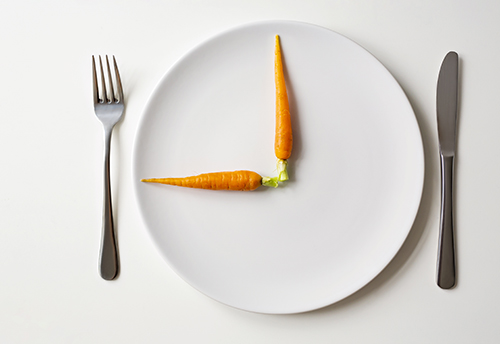Meal timing may affect heart health

It’s not just what you eat, but when you eat that matters to your health.
Research indicates variations in meal timing, from day-to-day and from weekday-to-weekend, affect several important heart health risk factors, including changes in waist circumference, body fat, blood pressure and blood sugar.
The lead researcher, Nour Makarem, a scientist at Columbia University Irving Medical Center in New York, had previously shown that eating more in the evening can increase a person's risk for heart disease. "But here, we show that it's not just about eating timing – it's also about the day-to-day regularity and the weekend-weekday regularity in our food intake," she said.
Makarem and her co-authors studied a group of 116 racially and ethnically diverse women, ages 20 to 64, who were part of the American Heart Association's Go Red for Women Strategically Focused Research Network. For a week, they used an electronic food diary to track what and when they ate. A year later, 99 of the women returned and repeated the process.
The idea that people shift their sleep patterns on the weekend has been dubbed "social jet lag." The team looked at day-to-day shifts in eating timing, duration of the eating period, evening eating and "eating jet lag" – differences in when they ate on weekdays versus weekends. The study considered the timing of the women's first and last eating occasion of the day; how long they went without food overnight; and what percentage of daily calories they consumed after 5 p.m. and 8 p.m.
When researchers looked at day-to-day variability in eating patterns, they saw that for every 10% increase in inconsistency in calories consumed after 5 p.m., the women had an increase of nearly three points in their systolic blood pressure (the top number in a reading) and more than two points in their diastolic blood pressure (the bottom number) over the study's one-year follow-up period. They also saw a significant change in HbA1c, an important blood sugar measurement used to diagnose diabetes.
Similarly, findings showed that an increase in day-to-day variability in calories eaten after 8 p.m. was related to more than a half-inch gain in waist size and a half-point increase in body mass index, a marker of body fat and body weight status.
When focusing on differences between weekdays and weekends, increased variability in timing and extent of evening eating and in duration of the eating period was linked to increases in systolic and diastolic blood pressure and in BMI a year later.
"It's not necessarily that on the weekend our eating timing is worse," Makarem said. "It's just that on weekdays, we're following a social clock, whereas on the weekend, we're following our natural biologic clock."
Makarem explained that the body's circadian rhythms – the innate or natural rhythms in our physiology, behavior and metabolism that evolved as an adaption to the 24-hour cycle of light and dark – ensure our body is synchronized with the environment and performs functions at optimal times.
These circadian rhythms are controlled by a "master clock" in the brain, she said. But individual organs, including those involved in metabolic processes that affect the risk of heart disease, have their own clocks. "And these clocks are regulated by food intake."
Dr. Deepak L. Bhatt, a professor of medicine at Harvard Medical School, said it can be hard to single out the precise links between meal timing, sleeping and heart health.
"All these relationships are difficult because nothing travels in isolation," said Bhatt, executive director of Interventional Cardiovascular Programs at Brigham and Women's Hospital Heart and Vascular Center in Boston. "All these things travel in packs. That is – somebody who's staying up late at night and eating late at night – they're also perhaps not getting a good night's sleep. That can also predispose them to weight gain."
The study emphasizes why it's important to watch the timing of your eating no matter what, Bhatt said. "Even if one feels they can't control their hours of sleep cycle, or their weekday-weekend mix of what hours they're awake and asleep, they can control what they put in their mouth and when."






